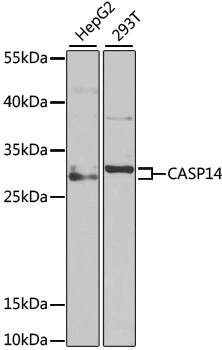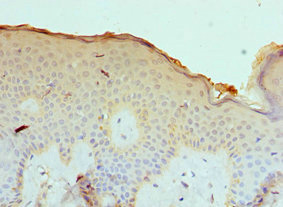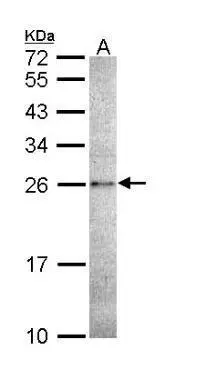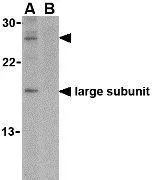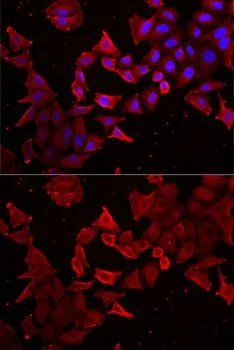
ICC/IF analysis of MCF7 cells using GTX33063 Caspase 14 antibody. Blue : DAPI
Caspase 14 antibody
GTX33063
ApplicationsImmunoFluorescence, Western Blot, ImmunoCytoChemistry
Product group Antibodies
ReactivityHuman
TargetCASP14
Overview
- SupplierGeneTex
- Product NameCaspase 14 antibody
- Delivery Days Customer9
- Application Supplier NoteWB: 1:500 - 1:2000. ICC/IF: 1:10 - 1:100. *Optimal dilutions/concentrations should be determined by the researcher.Not tested in other applications.
- ApplicationsImmunoFluorescence, Western Blot, ImmunoCytoChemistry
- CertificationResearch Use Only
- ClonalityPolyclonal
- ConjugateUnconjugated
- Gene ID23581
- Target nameCASP14
- Target descriptioncaspase 14
- Target synonymsARCI12, caspase-14, caspase-14, CASP-14, apoptosis-related cysteine protease, caspase 14, apoptosis-related cysteine peptidase, caspase 14, apoptosis-related cysteine protease, mini-ICE
- HostRabbit
- IsotypeIgG
- Protein IDP31944
- Protein NameCaspase-14
- Scientific DescriptionThis gene encodes a member of the cysteine-aspartic acid protease (caspase) family. Sequential activation of caspases plays a central role in the execution-phase of cell apoptosis. Caspases exist as inactive proenzymes which undergo proteolytic processing at conserved aspartic residues to produce two subunits, large and small, that dimerize to form the active enzyme. This caspase has been shown to be processed and activated by caspase 8 and caspase 10 in vitro, and by anti-Fas agonist antibody or TNF-related apoptosis inducing ligand in vivo. The expression and processing of this caspase may be involved in keratinocyte terminal differentiation, which is important for the formation of the skin barrier. [provided by RefSeq, Jul 2008]
- ReactivityHuman
- Storage Instruction-20°C or -80°C,2°C to 8°C
- UNSPSC41116161

